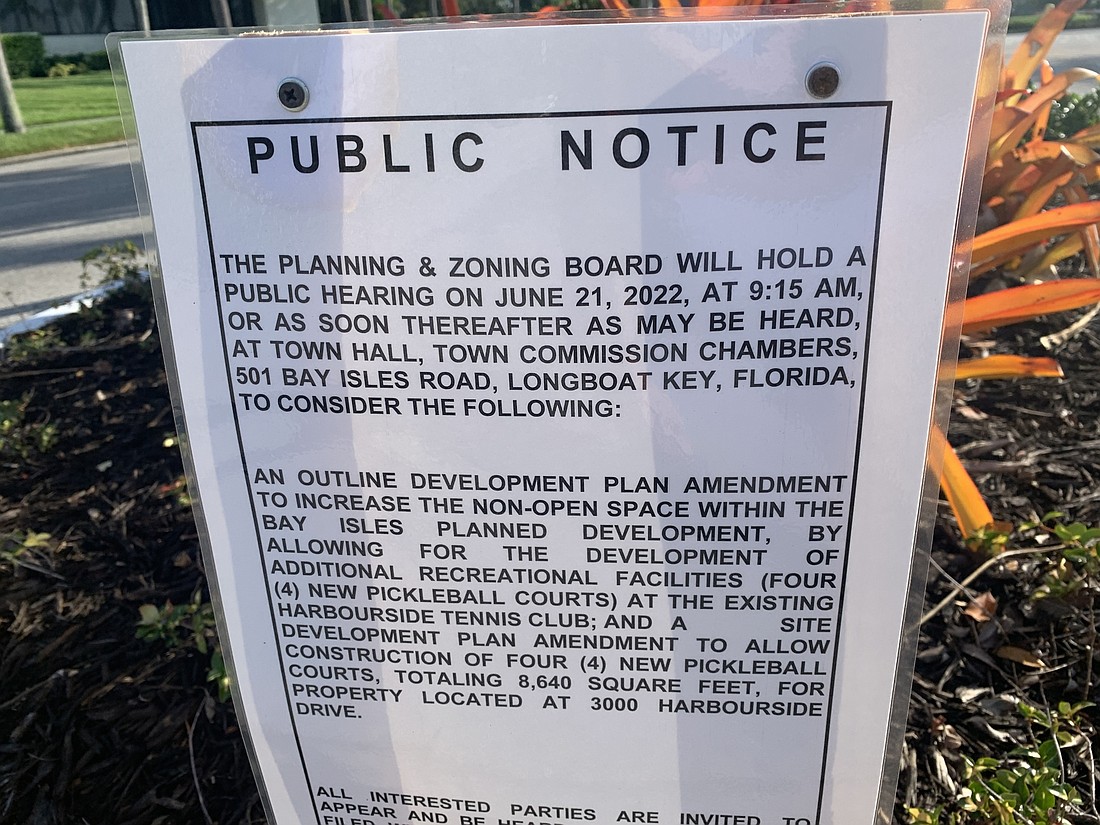- March 16, 2025
-
-
Loading

The Longboat Key Planning and Zoning Board approved the Longboat Key Club’s request Tuesday to continue discussion of its proposal to build four new pickleball courts adjacent to its Tennis Gardens until Sept. 20.
The continuance concluded a contentious morning in which residents, mostly from neighborhoods near the site of the proposed courts, spoke out against the possibilities of noise, lighting disturbances and tree removal and offered alternatives that would mitigate all of those concerns.
It was a very different scene from the original public hearing on the topic in April.
Instead of a nearly empty Town Commission chamber in April, about 40 people, including Commissioners Debra Williams and Penny Gold, attended on Tuesday.
Instead of a few minutes of discussion about sound in April, arguments Tuesday not only focused on the sound created by the play of the sport but also a key segment of the town’s sound ordinance that exempts recreational facilities "to which the public or community has access."
New discussion areas also focused on removal of trees planted in 2007 in the area of the proposed courts meant to screen light from the then-new Tennis Gardens and the potential of an alternative pickleball site elsewhere on Key Club property, perhaps even supporting construction of quieter tennis courts to accommodate. Also, outreach to the residents by the Key Club was encouraged by the board.
Board members voted 6-0 to accept the Key Club’s request for a continuance. Member Margaret Nuzzo was absent.
Attorney Edward Willner, who represents Winding Oaks residents, questioned the town staff’s assertion that the project meets the criteria of the noise-rule exemption, arguing that the Longboat Key Club is anything but accessible to the public.
"Intuitively, a private club is not a public facility," Willner said.
Town Attorney R. David Jackson, when asked his opinion, said he leaned toward agreeing with the town staff’s assertion about the exemption, adding there was no mention in the ordinance about private clubs and noting there was a difference between a for-a-fee-club and a private residence or condominium association, to which the public has no access.
Allen Parsons, the town’s director of planning, building and zoning, said the Key Club’s golf courses are also entitled to the noise-rule exemption as is the town’s own Public Tennis Center, even though fees are required to play in both places.
"The public would still have access by paying," Parsons said.
Board Chair David Green cautioned the other five members in attendance and members of the public that the legal issue had not been thoroughly researched. "Right now, we’re only going to have dueling legal opinions," he said.
That those dueling opinions were even voiced Tuesday was a result of the Key Club withdrawing its original application and starting over as a result in a delay in mailed-out notices announcing the first public hearing in April. Following the Planning and Zoning Board’s original approval, Winding Oaks residents argued against the proposal citing noise concerns, worries about lighting at night and the lack of notification.
Emails to Town Hall throughout May and June repeated the complaints of the specific noise created by the game, some claiming health issues would follow if the courts were approved, about 360 feet from the nearest homes. In one email, a writer claimed: “headaches, sleep issues and mental distress have been reported by residents living near pickleball courts. … With almost every game being four (or more) players, pickleball also has a higher ‘excitement’ level than a singles game of tennis, leading to more participation cheering and noise.”
Attorney John Patterson, representing the Longboat Key Club, said the club performed an informal sound test from a strip of club-owned land across the water from the proposed site but did not submit the results of that test as part of its presentation. Saying the test was not performed by experts with a device of unknown calibration, Patterson, without revealing the findings, said the results were encouraging.
"It’s not going to be an issue," Patterson said.
Patterson told board member Gary Coffin the club would be amenable to a more formal acoustic study before the issue is heard in again in a public setting.
He also said the club’s application meets all the town’s criteria for the development plan amendment with no legal justification for rejection. The club also is now proposing a 3-foot-high berm on the north end of the project, with a double row of fast-growing vegetation on top to help screen off potential noise.
"If the pickleball courts were to overlay the existing courts, we wouldn’t be here today," said board member Michael Warnstedt, referring to the town’s requirement for such a change to the development plan. Similarly, the Key Club’s conversion of tennis courts into pickleball courts in 2019 adjacent to the marina required no approval because the tennis facility was in place.
The residents’ group also requested the Key Club consider an alternative site for the courts, converting tennis facilities farther away and perhaps building new tennis courts at the proposed site on the assumption that tennis is quieter.
The town required four specific conditions: